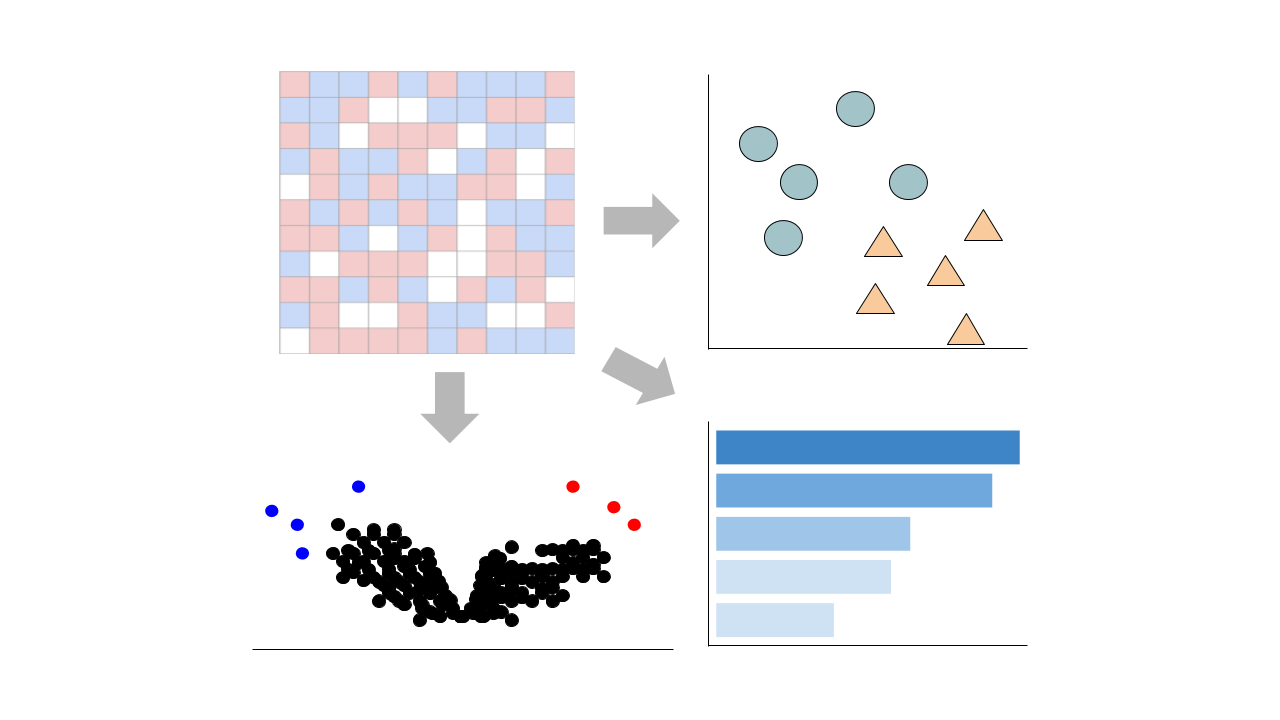 Gene counts are sourced from ARCHS4, which provides uniform alignment of GEO samples.
You can learn more about ARCHS4 and its pipeline here.
Gene counts are sourced from ARCHS4, which provides uniform alignment of GEO samples.
You can learn more about ARCHS4 and its pipeline here.
Select conditions below to toggle them from the plot:
| GROUP | CONDITION | SAMPLES |
|---|---|---|
| islets |
GSM1399562 GSM1399563 GSM1399564
|
|
|
GSM1399556 GSM1399557 GSM1399558
|
||
|
GSM1399553 GSM1399554 GSM1399555
|
||
|
GSM1399559 GSM1399560 GSM1399561
|
Submission Date: May 28, 2014
Summary: Aims/hypothesis Pancreatic beta cells maintain glucose
homeostasis and beta cell dysfunction is a major risk factor
in developing diabetes. Therefore, understanding the developmental
regulatory networks that define a fully functional beta
cell is important for elucidating the genetic origins of the disease.
Aldehyde dehydrogenase activity has been associated
with stem/progenitor cells and we have previously shown that
Aldh1b1 is specifically expressed in pancreas progenitor
pools. Here we address the hypothesis that Aldh1b1 may regulate
the timing of the appearance and eventual functionality
of beta cells.
Methods We generated an Aldh1b1-knockout mouse line
(Aldh1b1tm1lacZ) and used this to study pancreatic development,
beta cell functionality and glucose homeostasis in the
absence of Aldh1b1 function.
Results Differentiation in the developing pancreas of
Aldh1b1tm1lacZ null mice was accelerated. Transcriptome
analyses of newborn and adult islets showed misregulation of
key beta cell transcription factors and genes crucial for beta cell
function. Functional analyses showed that glucose-stimulated
insulin secretion was severely compromised in islets isolated
from null mice. Several key features of beta cell functionality
were affected, including control of oxidative stress, glucose
sensing, stimulus-coupling secretion and secretory granule
biogenesis. As a result of beta cell dysfunction, homozygous
mice developed glucose intolerance and age-dependent
hyperglycaemia.
Conclusions/interpretation These findings show that
Aldh1b1 influences the timing of the transition from the pancreas
endocrine progenitor to the committed beta cell and
demonstrate that changes in the timing of this transition lead
to beta cell dysfunction and thus constitute a diabetes risk
factor later in life.
GEO Accession ID: GSE58025
PMID: 26518685
Submission Date: May 28, 2014
Summary: Aims/hypothesis Pancreatic beta cells maintain glucose
homeostasis and beta cell dysfunction is a major risk factor
in developing diabetes. Therefore, understanding the developmental
regulatory networks that define a fully functional beta
cell is important for elucidating the genetic origins of the disease.
Aldehyde dehydrogenase activity has been associated
with stem/progenitor cells and we have previously shown that
Aldh1b1 is specifically expressed in pancreas progenitor
pools. Here we address the hypothesis that Aldh1b1 may regulate
the timing of the appearance and eventual functionality
of beta cells.
Methods We generated an Aldh1b1-knockout mouse line
(Aldh1b1tm1lacZ) and used this to study pancreatic development,
beta cell functionality and glucose homeostasis in the
absence of Aldh1b1 function.
Results Differentiation in the developing pancreas of
Aldh1b1tm1lacZ null mice was accelerated. Transcriptome
analyses of newborn and adult islets showed misregulation of
key beta cell transcription factors and genes crucial for beta cell
function. Functional analyses showed that glucose-stimulated
insulin secretion was severely compromised in islets isolated
from null mice. Several key features of beta cell functionality
were affected, including control of oxidative stress, glucose
sensing, stimulus-coupling secretion and secretory granule
biogenesis. As a result of beta cell dysfunction, homozygous
mice developed glucose intolerance and age-dependent
hyperglycaemia.
Conclusions/interpretation These findings show that
Aldh1b1 influences the timing of the transition from the pancreas
endocrine progenitor to the committed beta cell and
demonstrate that changes in the timing of this transition lead
to beta cell dysfunction and thus constitute a diabetes risk
factor later in life.
GEO Accession ID: GSE58025
PMID: 26518685
Visualize Samples
 Visualizations are precomputed using the Python package scanpy on the top 5000 most variable genes.
Visualizations are precomputed using the Python package scanpy on the top 5000 most variable genes.
Precomputed Differential Gene Expression
 Differential expression signatures are automatically computed using the limma R package.
More options for differential expression are available to compute below.
Differential expression signatures are automatically computed using the limma R package.
More options for differential expression are available to compute below.
Signatures:
Select conditions:
Control Condition
Perturbation Condition
Only conditions with at least 1 replicate are available to select
 Differential expression signatures can be computed using DESeq2 or characteristic direction.
Differential expression signatures can be computed using DESeq2 or characteristic direction.
This pipeline enables you to analyze and visualize your bulk RNA sequencing datasets with an array of downstream analysis and visualization tools. The pipeline includes: PCA analysis, Clustergrammer interactive heatmap, library size analysis, differential gene expression analysis, enrichment analysis, and L1000 small molecule search.

 Chatbot
Chatbot Single Gene Queries
Single Gene Queries
 Gene Set Queries
Gene Set Queries
 Bulk Studies
Bulk Studies
 Single Cell Studies
Single Cell Studies
 Hypotheses
Hypotheses
 Resources
Resources
 Contribute
Contribute
 Downloads
Downloads About
About
 Help
Help